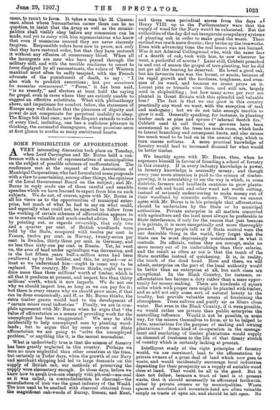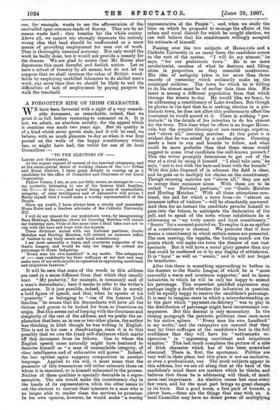SOME POSSIBILITIES OF AFFORESTATION.
AVERY interesting discussion took place on Tuesday, when Lord Carrington and Mr. Burns held a con- ference with a number of' representatives of municipalities on the subject of possible schemes of reafforestation. The conference met at the request of the Association of Municipal Corporations, wile had formulated some proposals with a view to ascertaining, amoue other things, the opinions of the Local Government Boareon the subject ; and Mr. Burns in reply made one of those careful and sensible speeches which we have learned to expect from him on such subjects. We do not, of course,agree with Mr. Burns in all his views as to the opportunities of municipal enter- prise, but much of what he had to say on what could, and especially what could not, be expected to follow from the worldng of certain schemes of afforestation appears to us to contain valuable and much-needed advice. He began by pointing out, as regards ownership, that only two and a quarter per cent. of British woodlauda were held by the State, compared with twelve per cent. in Fiance, twelve per cent. in Norway, twenty-seven per cent. in Sweden, thirty-three per Pent. in Germany, and no lose than elxty-one per cent. in Iluesie. Yet, he went on, the area of laud under agriculture wee decreasing, and in the last fifteen years half-a-Million acree had been swallowed up by the builder, and this, he argued—or at least so we understand him—ought In scque way to be replaced. The country, Mr. Burns thinks, ought to pro- duce more than three millions' worth of timber, which is all that it produces at present, and import less than thirty millions' worth, which it now imports. We do not see why we should import less, so long as we can pay for it; but there is every reason why we should grow more, if that can be done economically, and if, as Mr. Burns thinks, the extra timber grown would lead to the development of "certain minor rural industries." Finally, we are in com- plete agreement with Mr. Burns when he urges that "the Value of afforestation as a means of providing work for the unemployed has been exaggerated. ' We may be able incidentally to help unemployed men by planting wood- lands ; but to argue that by some syetein el State afforestation we are going -to "solve the unemployed peoblem," or anything like it is the merest moonshine, What it eedoubtedly true is that the science of foreetry has been greatly neglected in this country. Perhaps we were eo more neglectful than other countries at the time, but certainly in Tudor days, when the growth of our Navy ad merchant shipping had led to large deleaeds on the eqpply of Reitiph oak, our neethode of preserving the eupely were elementary enough. In thews dam before we knew how to emelt iron,ore cheaply with pitecoal–‘18a-coal as it was called, iii coetredistincGion to charcoal—the manufeeture of iron was the great industry of the Weald. The iron used to be smelted with charcoal obtaieecl from the megui4cAlut, eulr,w0044 of Surrey, Sussex. and Keet, and there were periodical scam from the days of Henry VIII. up to the Parliamentary wars that the supply of wood for the Navy would be exhausted. But the authorities of the day did not inaugurate compubtory systems of planting oak in order to make good the waste. Their method was much more drastic; they broke up the ironworks. Even with advancing time the real lesson was not learned. Was it not Admiral Collingwood who, with the same fear of a dearth of oak, took with him, to sow wherever lie went, a pocketful of acorns ? Later still, Cobbett preached in and out of season the gospel of tree-planting, but he did not get all the hearing he deserved. Ile loved a good oak, but his favourite tree was the locust., or acacia, because of its rapid growth and the hardness, toughness, and even- ness of its wood, and because no insect preys on it. Locust pins or trenails were then, and still are, largely used in shipbuilding ; but how many acres per year are planted in Great Britain with this splendid and valuable tree? The fact is that we can grow in this country practically any wood we want, with the exception of teak and mahogany ; but we do not take enough trouble to grow it well. Generally speaking, for instance, in planting timber such as pine and spruce (" infernal Scotch firs, Cobbett used to call them) our growers have been accustomed to give the trees too much room, which leads to lateral branching and consequent knots, and also causes too much wood to be laid on in the annual ring, which in turn causes softness. A more practical knowledge of forestry would lead to increased demand for what would be better timber.
We heartily agree with Mr. Burns, then, when he expresses himself in favour of founding a school of forestry in this country. If in every industry knowledge is power, in forestry knowledge is assuredly money ; and though every year more attention is paid to the science of timber- growing, it is astonishing to see the way in which, in some districts, farmers and landlords continue to grow planta- tions of ash and hazel and other wood not worth cutting, instead of seriously e.udeavouring to make money out of their woodland by scientiec culture. Where we cannot agree with Mr. Burns is in his principle that afforestation should be undertaken by the State or by municipal authorities. Private enterprise in all matters connected with agriculture and the laud, must always be preferable to State interference, if only for the reason that Just because it is private, it is more energetically and more thoroughly pursued. When people talk as if State control were the one desirable thing in the wqrld, they forget that the State can be most depressingly uninterested, in what it controls. Its officials, unless they are corrupt, make no more money out of its undertakings than their salaries, and the result as often as not is that the touch of the State mortifies instead of quickening. it is, in reality, the touch of the dead hand. Here and there, we will admit, enterprise on the part of the local authority would be better than no enterprise at all, but such cases ere exceptional. In the Black Country, for instance, re- afforestation has become a duty rather than a mere oppor, tunity for money-making. There are hundreds o quAre miles which with proper care might be planted with timber, and so add not only some sort of natural beauty to .the locality, but provide valuable means of freshening the atmosphere. Trees enliven and purify air as alters demi water. But even in the Black country, if it were possible, We would rather see private then public enterprise the controlling influence. Would it ant be possible, IR some Way, for the miners themselves to form, or to NI helped to form, associations for the purpose of making and owning plantations ? Some kind of cosoperetion in the manage. taunt and merketieg of timber p.ntaticuis would supply an element of freshness to the life of that dreary ;4%4; of country which is certainly lacking at present, Intelligent study of the right principles of forestry would, we are convinced, lead to the afforestation by private owners of a great deal of land which now goes to waste, and would incidentally encourage local industriee depending for their prosperity on a supply of suitable woad close at hand. That would be all to the good. But it does not follow, because a. tract of land is at present waste, that it should necessarily be afforested forthwith, either by private owners or by municipalities. Waste spaces of moorland and mountain-land are often valuable simply as tracts of open air, and should be left open. No
one, for example, wants to see the afferestation of the unrivalled open common-lands of Surrey. They are by no means waste land ; they breathe for the whole county. Above all, we cannot too strongly deprecate the entirely wrong idea that land should be reafforested as a mere means of providing employment for men out of work. That is thoroughly unsound economy. Not only would the work be badly done, but it would not provide a remedy for the disease. ' We are glad to notice that Mr. Burns also' deprecates this most harmful and foolish notion. Let us have a school of forestry by all means, but do not let us suppose that we shall increase the value of British wood- lands by employing unskilled labourers to do skilled men's work, any more than that we should• be likely to end the difficulties of lack of employment by paying paupers to walk the treadmill.

















































 Previous page
Previous page